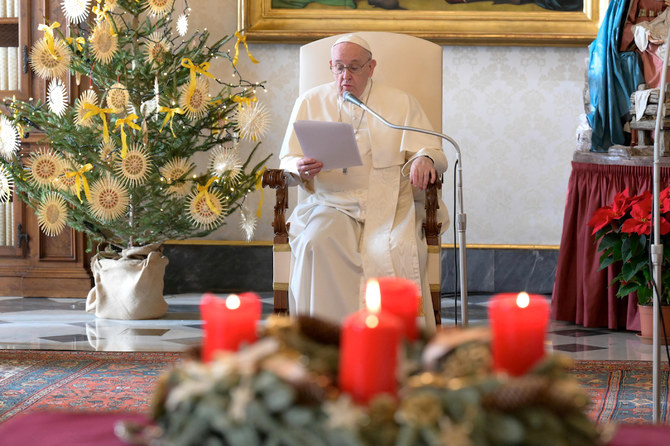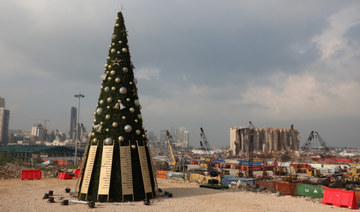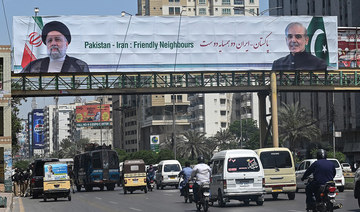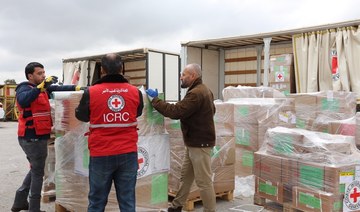BEIRUT: Pope Francis, the chief pastor of the worldwide Catholic Church, included a message to the Lebanese people in his Christmas address from the Vatican on Thursday.
Speaking of his sorrow at the suffering that has engulfed Lebanon in 2020, he said. “It is even more painful to see you deprived of your precious aspirations to live in peace and to continue being, for our time and our world, a message of freedom and a witness to harmonious coexistence.”
The pope appealed to Lebanon’s political and spiritual leaders to place the common good ahead of personal gain, borrowing a passage from one of the pastoral letters of Patriarch Elias Howayek, who played a leading role in the independence of Lebanon and the birth of the Greater Lebanon state in 1920: “You are responsible, you are the judges of the earth, you are the people’s representatives, who live on behalf of the people, you are obligated, in your official capacity … to pursue the common good. Your time is not devoted to your interests, and your job is not for you, but for the state and for the nation that you represent.”
Pope Francis said he hoped that the Lebanese would benefit “from the current fluctuations of circumstances to rediscover their identity,” stressing that they should not desert their “homes or inheritance, nor give up on the dream of the future of a beautiful and prosperous country.”
The pope said he would visit Lebanon “ as soon as possible” and called on the international community to “help Lebanon stay out of regional conflicts and tensions.”
On Thursday, Lebanon’s Maronite Patriarch Bechara Al-Rai devoted part of his traditional Christmas message to his failed initiative to facilitate the formation of a new government. He also criticized politicians and discussed the crises facing Lebanon.
Al-Rai said: “The victims and the afflicted of the Beirut Port blast were assassinated with uncontrolled weapons, and their hearts (are) caves of grief. What is painful is that the forensic investigation revolves around itself and the jurisprudence and authorities. But the disaster is greater than everyone and surpasses everyone’s immunity.”
Al-Rai added: “Rarely has a nation experienced such a serious crisis, and (seen its) leaders as reluctant to save it as our leaders. This crisis would not have occurred had it not been for the poor performance of this political group from years ago to today. They see politics as an art to serve their interests and disrupt public life and constitutional entitlements — humiliating the people, corrupting institutions, obstructing the judiciary, and hammering the economy and the currency, as if this political group is managing an enemy state.”
Al-Rai warned, “There are those who want to destroy Lebanon, intentionally or ignorantly. But we are determined to meet the challenges, no matter how many there may be, and to save a democratic, neutral, and independent Lebanon — the Lebanon of sovereignty, partnership and sophistication.”
Al-Rai also spoke of “hidden and fabricated difficulties impeding the formation of the new government.” He said, “We were betting on conscience. But we regret the failure of the promises that were given to us. The formation of the government returned to the starting point. It would be preferable if those concerned would talk openly to the people about the reasons for not forming the government. The people have the right to know their reality and fate.”
Al-Rai also echoed the pope’s call for the international community to ensure Lebanon does not become embroiled in regional conflicts.
President Michel Aoun called Al-Rai on Thursday to apologize in advance for not attending the celebratory mass in Bkerke on Friday — Christmas Day — due to the COVID-19 pandemic.
Sources close to Aoun said that the president’s rejection of the suggested cabinet lineup presented to him by Prime Minister-designate Saad Hariri two weeks ago was that it “lacked balance and fairness in the distribution of portfolios among the sects” and that Hariri had demanded “the two portfolios of Justice and the Interior, that is, the equation of security and the judiciary. It is illogical for the government to be run by one person.”
On Thursday evening, large numbers of Lebanese expatriates arrived at Rafic Hariri International Airport in Beirut to spend the holidays with their families, resulting in long queues for the PCR tests that would mean they could avoid quarantine.
The Ministry of Health said more than 17,000 PCR tests had been conducted on Thursday alone, and also renewed its instructions to respect preventive measures during family gatherings over the holidays.
The ministry is reportedly braced for a huge increase in the number of COVID-19 infections after the holidays. Wednesday’s total of 2,246 new infections in the country was the highest since the pandemic began.



























